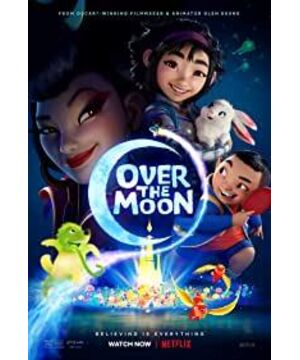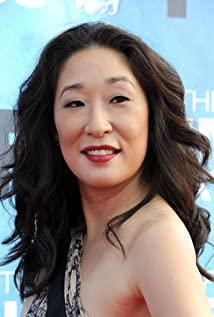"Flying to the Moon" is directed by Gran Keane. Casey Ang, Philippa Su, Robert Qiu, Zheng Ken and others participated in the English dubbing, and Cao Yawen, Zhang Anqi, He Xiangdong, Li Dan and others participated in the Chinese dubbing. Animated movie. The film was released in China on October 23, 2020[1]. The film tells the story of a little girl, Feifei, who went to the moon to meet Chang'e in person, and experienced an unexpected adventure on the moon[2].
What kind of company is Oriental DreamWorks?  Kung Fu Panda 3 Zhihu score 6. 8 What progress and achievements have been made in the past few years from animation production to company capital? 1 answer _ It is not conscious of the outside and not tempted on the inside. Hello, friends, let’s say it, the name sounds good, there are not many big cows, but newcomers can be fooled. In fact, it is basically a good place for old-age care. From Western Disney to Eastern DreamWorks, who should tell the Chinese story? Two months ago, on October 23, the animated music film "Over the Moon" (Over the Moon), co-produced by Oriental DreamWorks and Netflix, will be released simultaneously in domestic theaters and on the Netflix platform. ▲ Official poster of "Flying to the Moon". From preparation, establishment to production, every step of Oriental DreamWorks has attracted much attention. In 2012, it was jointly established by the Chinese Cultural Industry Investment Fund (CMC) and DreamWorks Animation (DreamWorks). In 2018, a peaceful "breakup" with the US, a Chinese consortium headed by Chinese culture achieved a wholly-owned holding of the company. ▲ So far, Oriental DreamWorks has produced two works: "Kung Fu Panda 3" (2016) and "Snowman Romance" (2019). The latter "from creativity, production, production, including the formulation of distribution strategies, are fully controlled by the Chinese team." After achieving a wholly-owned holding, CEO and chairman Li Ruigang said in an interview with The Paper that the principles of Oriental DreamWorks It is "interpreting Chinese stories with Hollywood narratives". It is committed to developing animated stories that have Chinese characteristics and are welcome in the global market. Regardless of the results, this is undoubtedly a movie manifesto that is extremely commercial ambition and very inspiring national self-confidence. Judging from the trailers that have been exposed so far, "Flying to the Moon" does indeed follow the "international" route of combining Chinese and Western, mixing the old and the new: the heroine Feifei has the poetic and sentimental feelings of watching the moon in the traditional narrative, and is also endowed with extremes. With modern scientific exploration spirit and practical ability, he made his own "rocket" and went to the moon. The moon she came to not only has the topography and landforms we are familiar with in space probes, but also became a surrealistic fantasy theater in Chang'e's chasing love carnival. ▲ "Fly to the Moon" trailer. Efforts to render the unique visual expression of regional festivals, while digging into the universal emotional core, the main family affection and national signature "Flying to the Moon" can not help but remind people of the Pixar animation that was popular around the world three years ago. "Looking for a Dream" (Coco). The Day of the Dead (Dia de los Muertos) is the theme. In addition to providing a full and rich audiovisual experience, "Dream Travels" explores the propositions of life and death very seriously, showing the real tension between individual realization and family responsibilities. What's more noteworthy is that in the Trump era, the more complicated US-Mexico relationship gave "A Dream of Dreams" a more special geopolitical dimension. As the highest-grossing film in the history of Mexico, many Latin American film critics also recognized the "authentic" Mexico presented in the film: Mexican culture is treated with the utmost respect. Mexican culture is treated with dignity, honor, respect, and the utmost reverence. ——Vanessa Erazo Happily, "Dream Quest" has not been washed "white". Happily, Coco did not get whitewashed. ——Claudia Puig has achieved general success in the international market. "Dream and Travel" can be described as a rare success case of this kind of cross-cultural animation film. The reason why it is said to be "rare" is because more often, in the adaptation and appropriation of non-Western themes, cultural identity and diversity are still a long-term multilateral tug-of-war. In other words, behind the grand blueprint of "interpreting Chinese stories in Hollywood narratives", there are not only fierce frictions and conflicts of cultural discourse power under the current political situation, but also implied that the outdated power structure is a lasting and lasting influence on the production of animated films. Invisible influence. In this regard, Cambridge University scholar Michelle Anya Anjirbag has such a precise summary: Despite claiming the cultural pursuit of diversity, when telling stories from non-Western regions, Disney, which is in a structure of cultural hegemony dominated by white people, still has deep roots. Post-colonialism. ——Michelle Anya Anjirbag As the "other" from the East, Disney "princesses" such as "Mulan" and "Moana" are placed on the other side of the dual structure of "Western" and "non-Western". A specific way is packaged, interpreted and constructed. Under the beautiful doorplate of "Advocating Cultural Diversity", they have become very exotic and charming advertisements in the eyes of American audiences. Furthermore, there is actually an irreconcilable contradiction between Hua Mulan as the Disney princess IP and the "Chinese-ness" behind it. Anjirbag believes that the expression of "Chineseness" and the role of "Mulan" are actually separate. The former exists as well-designed stylized music and visually gorgeous oriental imagery in the film. In contrast, as a female hero who resisted patriarchy and was endowed with contemporary independence, Mulan became an outsider of "Chinese culture." Using "created authority", Disney implies that patriarchal and conservative ideas are actually inherent in Chinese culture, directly pushing them arrogantly to the opposite of contemporary humanistic spirit. ——Michelle Anya Anjirbag ▲ Stills from the cartoon "Mulan". Twenty-two years later, in the live-action "Mulan" movie "specially for the Chinese market", it can be seen that Disney's attitude has not been fundamentally changed. In the cultural appropriation that is not modest enough, the contradiction between the audience and the film has been further intensified. Even if she is already a well-known actress in China, Liu Yifei's Hua Mulan still acts as an awkward "other" in Disney's fairy tale world. The rather bleak box office and word of mouth seem to have proved that Disney's Hua Mulan can neither become the so-called Chinese hero who regains the right to speak in the story, nor is it a cultural symbol with a true cross-cultural attitude and ability. Even so, the rich story resources in the non-Western world and the untapped market still allow Hollywood to tell the Chinese stories endlessly. Recently, it is said that Ron Howard (Ron Howard), who has directed "Beautiful Mind", will become the director of the personal biopic of pianist Lang Lang. Taking the failure of "Mulan" as an example, the director of "Don't Tell Her" Lulu Wang expressed public doubts to Howard's team on his Twitter: ▲"As a traditionally trained man born in China Pianist, I think that unless you have a personal understanding of Chinese culture, the impact of the Cultural Revolution on artists and intellectuals, and the results of Western imperialism, Lang Lang’s story cannot be told well... shouldn’t we? Did you learn anything from "Mulan"?..." As Wang Ziyi said, despite the lineup of almost all Asian actors, the core production team of "Mulan", such as the director, script and photography, has There are no workers from mainland China. Wang Ziyi's worries about Lang Lang's biopics may also originate from this. In an interview with Variety, Peilin Chou, the chief creative officer of Oriental DreamWorks, also said that the American director of "Flying to the Moon" was chosen because: We need Glenn Keene (Glen Keane). Because there are no people of the same level in China. It is difficult for local film talents to connect and enter, which seems to be an important dimension in solving the above-mentioned cross-cultural aphasia syndrome. In the existing Hollywood talent training and delivery system, they will never be committed to providing new cultural identities and new interpretation possibilities, nor do they have any need to ask questions about the existing structure. After all, to adopt and adapt themes from the non-Western world, you only need to be proficient in using the smooth cross-cultural translation rules and master the effective Hollywood movie grammar. The re-encoding and processing of the industrial system can quickly be transformed into the next attractive and beautiful dish in the lively restaurants of the global film capital market. When no one was able to change the menu, films that simplified the picture of globalization in this way and used the "other" to cater to the proposition of political correctness are still emerging today. On October 6, the female agent film "The 355" directed by Simon Kinberg, who directed "X-Men: Black Phoenix", unveiled its new poster and trailer. ▲ The film is starring Jessica Chastain (USA), Diane Kruger (Germany), Lupita Nyong'o (UK), Fan Bingbing (China), Penelope Cruz (Colombia), They represent five female agents in different regions of the world, and they are tasked with saving the planet. "Agent 355" was once a synonym for female spies during the American Revolution. As soon as the trailers and posters came out, netizens on domestic social media kept talking, but most of them questioned the amount and sense of presence of the Chinese actor Fan Bingbing. And on the other side of the earth, Clayton Davis, a writer who uses Penelope Cruz to represent Colombia and focuses on Latin American Hollywood entertainment circles, deserves to be placed in the dual structure of the "non-Western" one. Let’s reflect on the side: American consumers may be accustomed to mixing all Spanish speakers... When'white' Hispanics get the opportunity to show themselves in front of the screen, non-whites, mixed ethnicities, and Afro-Latinos Actors of American origin are still forced to act as drug carriers and gang members. American consumers may be used to lumping together all Spanish speakers... The “white” Hispanic people are getting roles to put themselves in front of the eyes of the world, while non-white, mixed and Afro-Latinx performers are banished to drug mules and gangbangers. ——Clayton Davis and has a rich history and complexity Like the Latin culture of the context, in the extremely specific and vivid Chinese context, the passive situation of "otherization" will also exist for a long time in the film capital market still dominated by Hollywood. In this sense, the local attempt of Oriental DreamWorks, which claims to be "dedicated to world-class animation production," has been given higher expectations. Compared with how many Chinese faces we are familiar with appear on the big Hollywood screen, how to actively connect the rich creativity and narrative themes derived from China, and even rewrite the existing international pattern, may be a more urgent question it wants to answer. ▲ "Fly to the Moon" trailer. Just a few days after publishing doubts about Lang Howard’s team, using the "American Chinese food" orange chicken as a metaphor, Wang Ziyi, who was born in the northeast like Lang Lang, expressed a way of broadening the right to speak in Chinese films with local themes. Looking forward to: ...I also happen to like to eat orange chicken, but besides that, isn't it a good time to expect us to have some other choices? Will "Fly to the Moon" be a good dish with a special flavor? Let us wait and see together. ——Clayton Davis, like the Latin culture with rich history and complex context, in the extremely specific and vivid Chinese context, the passive situation of "otherness" will also exist for a long time in the film capital market still dominated by Hollywood write. In this sense, the local attempt of Oriental DreamWorks, which claims to be "dedicated to world-class animation production," has been given higher expectations. Compared with how many Chinese faces we are familiar with appear on the big Hollywood screen, how to actively connect the rich creativity and narrative themes derived from China, and even rewrite the existing international pattern, may be a more urgent question it wants to answer. ▲ "Fly to the Moon" trailer. Just a few days after publishing doubts about Lang Howard’s team, using the "American Chinese food" orange chicken as a metaphor, Wang Ziyi, who was born in the northeast like Lang Lang, expressed a way of broadening the right to speak in Chinese films with local themes. Looking forward to: ...I also happen to like to eat orange chicken, but besides that, isn't it a good time to expect us to have some other choices? Will "Fly to the Moon" be a good dish with a special flavor? Let us wait and see together. ——Clayton Davis, like the Latin culture with rich history and complex context, in the extremely specific and vivid Chinese context, the passive situation of "otherness" will also exist for a long time in the film capital market still dominated by Hollywood write. In this sense, the local attempt of Oriental DreamWorks, which claims to be "dedicated to world-class animation production," has been given higher expectations. Compared with how many Chinese faces we are familiar with appear on the big Hollywood screen, how to actively connect the rich creativity and narrative themes derived from China, and even rewrite the existing international pattern, may be a more urgent question it wants to answer. ▲ "Fly to the Moon" trailer. Just a few days after publishing doubts about Lang Howard’s team, using the "American Chinese food" orange chicken as a metaphor, Wang Ziyi, who was born in the northeast like Lang Lang, expressed a way of broadening the right to speak in Chinese films with local themes. Looking forward to: ...I also happen to like to eat orange chicken, but besides that, isn't it a good time to expect us to have some other choices? Will "Fly to the Moon" be a good dish with a special flavor? Let us wait and see together.
View more about Over the Moon reviews











